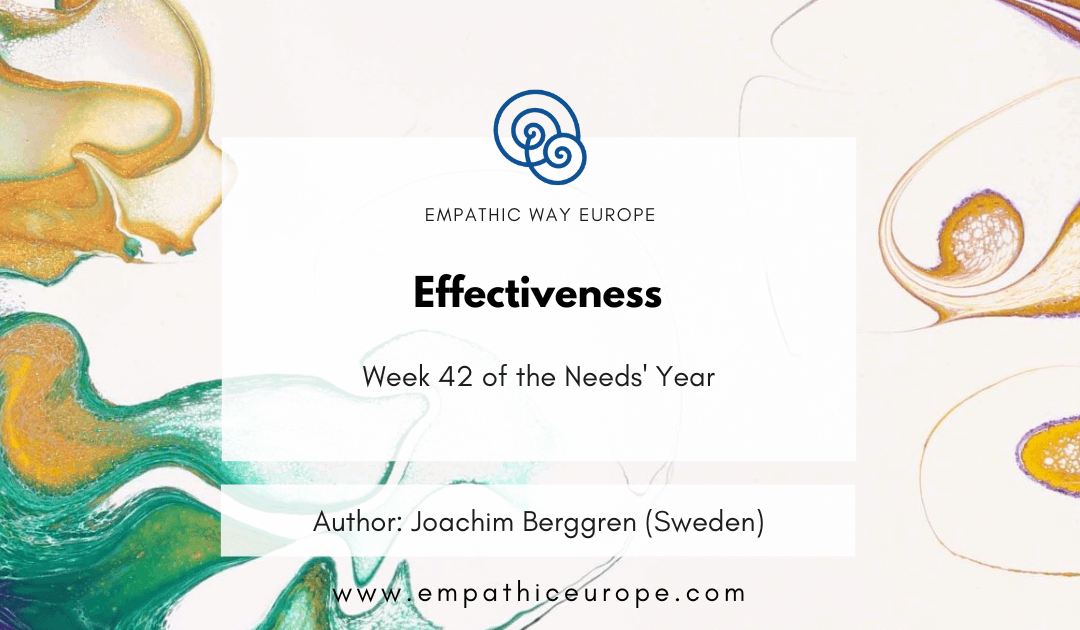I walk a few steps to get the oxygen flowing in my veins and get another cup of coffee. Then I sit down at the coffee table and continue writing. It goes fast and I’m enjoying myself. Various reflections pop up in my head at the same time as I effortlessly formulate texts on the computer. This way, during a couple of hours of writing, I finished more than a week’s amount of daily reflections in my project “The Daily Empathizer”.
This recurring event takes place in an empty cafe close to my home. In that space I don’t have other tasks that demand attention. The only working tool I have in front of me is a computer without connection to wifi, so there are no external distractions. I don’t even have to make coffee! I can just pick up a new cup whenever I want and keep working. A perfect arrangement for me to work effectively.
The basis is our mortality
When I think of the need for effectiveness, my thoughts turn towards my limited life span. If I weren’t mortal, I don’t think I would have a need for effectiveness. If I were surrounded by an infinite space of time, there would be no rush and therefore no need to be effective. Being human, I therefore need to take my limited time into account to live a rich and meaningful life.
I also think about resources other than time. If we as a species are to survive in this closed, limited system that is our planet, we need to manage what surrounds us in a sustainable way. By using raw materials and other resources effectively, we increase our chances of meeting our own and future generations’ needs in the long run. Effectiveness and sustainability are intertwined.
Effort leads to success
There was a period in my life a few years ago, when I was reading and listening to a lot of self-help books. Almost all of them were about being successful in professional life. It was about optimising and streamlining various aspects of one’s life. The message was that only a few percent of the population has this willingness to make the effort in doing what’s required. It’s up to you to succeed or not, just follow all the advice and you will make it. Most of the suggestions and ideas seemed reasonable, but I was behaving like most people: rather than putting theory into practice, I threw myself enthusiastically at the next self-help book.
I often found the messages of these books superficial. It was a lot about financial success and almost all the books focused on the superior individual succeeding in a liberal market economy. It was a message that could not be easily applied by the majority of the world’s population. I soon began to redefine the concept of effectiveness. I didn’t want to be effective to make a career and make money. I wanted to be effective by minimising work time and energy in the areas of my life that I labelled “necessary and not enjoyable work”.
Effectiveness, joy and meaning
From this point of view, I was able to consume self-help literature with a nobler purpose. My aim now was to minimise working hours in order to devote more time to enjoyable and meaningful activities. I can roughly divide my life into three parts: work, leisure and recovery. With a limited number of hours per day, I can exchange the time I spend on each of these areas. To live a rich and meaningful life, I need to allocate my resources in a way that balances the time and energy used to keep me alive and to devote the excess to things I find meaningful and joyful.
In certain things I do, I don’t want to be effective. When I’m doing something I like, I often don’t want to finish the activity as quickly and effectively as possible. In order to engage in such activities, I want to be as effective as I can in certain areas of my life so that I can maximise the time I spend and enjoy in other areas.
Need awareness
While writing this text, I become aware that I separate work and leisure. My goal seems to be to minimise time spent on work and maximise time spent on leisure. If I would manage to continuously be aware of and in touch with my needs, I believe this separation would cease. Marshall Rosenberg said that “When we are conscious of the life-enriching purpose behind an action we take, then even hard work has an element of play in it.”
Based on this awareness, perhaps effectiveness is about contributing to my own and others’ needs? Or phrased in a more elegant way in yet another quote from Marshall: “What I want in my life is compassion, a flow between myself and others based on a mutual giving from the heart.” When I consider the need for effectiveness within the context of these two quotes, I notice my body softening and I am being able to embrace this need with more warmth and tenderness.
How is effectiveness contributing to your life?
Leave a comment below or, if you are a Premium subscriber of “The Needs’ Year”, at the online platform: https://empathiceurope.com/online/courses/the-needs-year/modules/week-42/
Author
Joachim Berggren (CNVC Certified Trainer)
_ _ _ _
On 18 October at 18:00-18:45 CEST, you can participate in a Zoom Talk with me and Jürgen Engel. We will talk about the need for effectiveness.
Sign up for the Needs’ Year and you will receive a link to Zoom.
If you read this afterwards, you can watch the recording when you become a premium subscriber. Check the details HERE.

